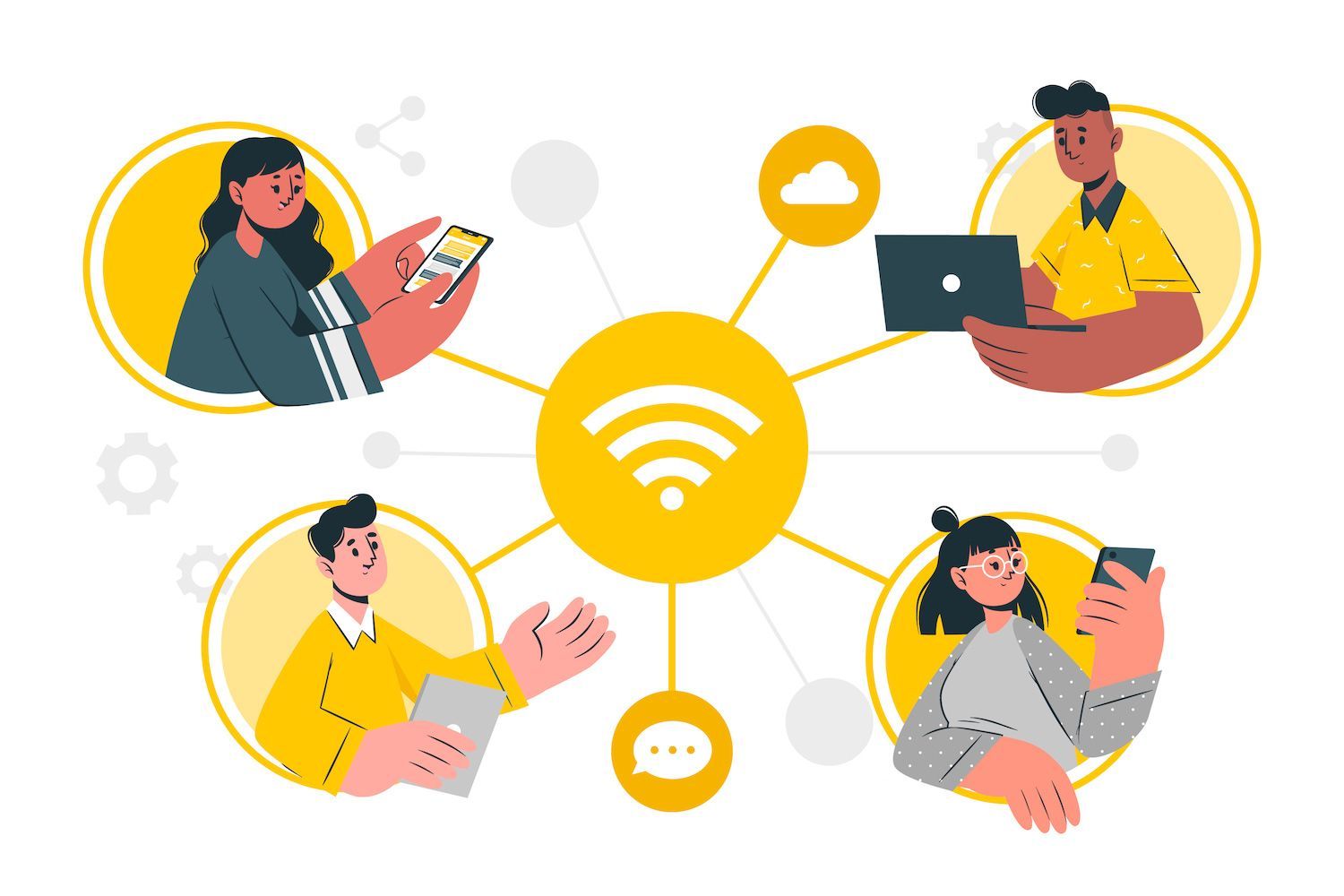What is Online Community Management? |
If you're looking to enhance the management of your community online, be it through social media, or even an exclusive community space, this article will explain what you should know about community management.
What exactly is community management?
The process of community management that determines the type of interactions that customers have with your company usually through the web. Many brands hire someone specifically for this purpose, and are referred to as a community manager. Actually, one of Instagram's initial hirings was for a community manager.
The management of online communities requires active listening and involvement for the sake of the brand, especially via social media channels. Community managers are the ones who are the spokespersons for the brand. they are able to conduct promotions, customer services and engaging activities to engage customers, and even public relations along with damage control.
A well-managed community makes the brand appear less of an inaccessible organization, but instead... it's... authentic. When done correctly, it will provide the brand with a identity, personality and make people experience some thing. That's why it's an important part of any strategy for customer engagement.
Customers that are now or in the near future will be awed by your brand's presence online. According to research "people prefer to do business with people who they know, like, and trust" and good social media management will make that sense.
Community management, however, can bring a bunch of other benefits to your business also. It can help you collect useful feedback about the products or services you offer, figure out where people are having issues (their experiences with customers) as well as what the most attractive selling points are. For these reasons and more If you're a company, brand or a business should consider incorporating a community management approach in your service for customers.

The growth and power of communities on the internet
The need to manage communities is growing as we spend longer trying to locate the social media community, or specifically, on communities.
Did you ever know?
- 86 percent of Americans (90 million) have contact with the internet social network (Pew).
- 79% are in constant contact with at least an online community (Pew).
- An investigation from the year 2019 revealed it was 76% of internet users took part in community forums online.
- The largest portion of the web-based creators are small-scale companies (est. 168+ million).
- 50% of respondents to a Pew survey said that being part of their online communities made them more familiar with people that they might not have otherwise met.
- 93 93 percent of users make use of social media sites for assistance in technical issues related to their product (Oracle).
- 20% of customers have purchased of something due to posts in social media (Oracle).
- 37 percent of the population believe in brand influencers and companies (Oracle).
- The income of creators in 2023 rose by 370 million dollars.

Benefits of community management via online
When you start actively managing your online community, whether you call it social media or an exclusive community area, some amazing changes begin to happen.
- Create buzz and conversations on your brand
- React quickly and effectively to potential PR disasters
- Improved customer advocacy through conversation with users who are real
- Explore ideas for unique products and ideas.
- Increased revenue or opening up new avenues for monetization
A community manager can be an empowering. And since the majority of customers are annoyed by customer support channels (and do not like answering the telephone) and having the opportunity to experience a positive interaction for someone that represents a company (or possibly even getting help) is a major improvement!
What exactly is management of communities on the internet?
It is not uncommon to speak of managing communities online. The management of community members in an online community is the process of applying the concepts of community management. It involves hosting a discussion, generating communities, and boosting the visibility of the brand in a particular community.
A lot of the same principles are applicable to online communities. However it offers a different approach to engage in targeted interaction that can make community management unique and (we'd argue) better than.
Community management in an online community means:
- There's no need to persuade customers to take an interest in your brand. When they sign up with the company, it's due to their interest.
- It's not a matter of siloing your content and efforts across different platforms for social media. Instead, the concentration is on one place.
- The primary focus is on the content that users create (more on this subject in the next section) This means that you will perform less work than the social networks.

The job of community manager
A community manager is one who is responsible as the spokesperson for the brand's online presence typically, becoming the spokesperson for the brand's image to those in their network and the voice of the customer towards the brand. It is important to realize that community managers aren't just creators of content. Though they might make the content, their job can be more of a relation creator and connector.
One of the problems in conventional social media platforms is that often community managers become celebrities as content creators. That's for a reason: Companies that use social media weren't made to create communities. They were built for broadcasting and creating followers. Thus, many businesses opt for"community manager" as well as "community manager" as the person that responds to questions asked through social media. They also have the option to give a funny response or post in the name of the company.

When it comes to an individual community platform the role of a manager for a community is distinctive. Instead of trying to get attention or do tech support, a manager supports members to interact with fellow members in search of community and belonging. They engage in lively discussions and host interesting live activities.
If it's about platforms designed for community Community managers are the ones who shine.
Tech's role
Also, we're seeing lots of innovative technology coming to the world of community management, promising more engagement and connections. In particular, on traditional social networks community managers could rely on tools for scheduling and monitoring the mentions (e.g. Hootsuite as well as Sprout Social) and perhaps an net promoter score (NPS) tracker software.
Additionally, we're witnessing the development of community technology to alter the roles of community managers and help them manage their time more efficiently. The more sophisticated community platforms are able to offer and capabilities, the more they enable community managers (and help administrators to better manage the time they spend). Community platforms today offer instruments for:
- Tracking and management of member
- Messaging, discussions, comments, polls, etc.
- Live streams and real-time events
- Instruction and classes
But at Mighty we're enthusiastic about using technology in order to strengthen communities. We've seen it change the way we manage community.
In the case of the case of Mighty Co-Host(tm) this team is employing tools like profil assist, question generators and the "make more efficient" writing editor and automatic course outline for making the work of an administrator of communities easier than it has ever been. This can help simplify and cut down on the community administration to allow you to focus on building real-life, personal connections.
How to master the art of community management?
If you're trying to master the art of community management, you must be aware of these guidelines you should know. Use these tips to witness an actual change within your neighborhood
- It is important to make sure that you're aware of the primary objective. Your Big Purpose should be your motive, the reason why people want to get in touch with you or your company. Most often you will find that the Big Purpose refers to the positive change that you wish to see in your clients. So, the efforts you make in managing your community will assist in achieving that change. If you're encouraging, teaching or dealing with technical issues, it all helps the members to be in love with one other.
- Feel a sense that you are part of the community. The real art of managing communities isn't just about engagement. The magic happens when you build a sense of the feeling of belonging.
- The content created by the user is always quick. People liking a brand article isn't necessarily a sign of anything. However, what about people who post on your company? That's worth the weight in gold. Sometimes, the best way to do this is to do it through giveaways or hashtags may encourage UGC. When you are a part of a group, UGC happens more organically as you host a conversation on the topics that members are most concerned about.
- Choose the right platform. Finding the best platform for your community management can transform the entire process. In particular, there's an immense difference between a community that's an online community on the back end of a business site, and one that incorporates livestreaming and events to conversations through the form of an app.
- Set clear guidelines. The safety of the psychological in the community is vital. That's why community rules and moderation in a dedicated community are essential. Making sure that people feel secure and comfortable (and safeguarding them against getting targeted by trolling and harassment) is essential to the growth of a stable community.
- Create rituals. The pace of life in a community matters by having regular routines and consistent events that allow people to feel a part of it. For instance, planning the possibility of having a live stream every quarter, and even streaming once a week could become an important ceremony.
- Create feedback loops. Then, all members of a community should be able provide feedback and to an administrator for their community in an authentic way. Community managers generally seek feedback through surveys.

Measuring the Success
Key Performance Indicators (KPIs)
There are many methods to gauge the effectiveness of your community management, using traditional social media platforms, or within an online community.
Social media is considered to be traditional
- Likes and follow-ups on new likes, comments, and likes. It's the most simple, yet the increase in followers on social media can show that community management efforts pay off.
- More relevant organic search. The excitement that an organization can bring via social media can be manifested in the rise of organic search.
- Positive material or queries concerning your brand, which do not belong to you.
- The current trend is up. You could use an application like Google Trends to track the increase in awareness of the brand.
- An increase in Net Promoter score. Measured through surveys The NPS can be a gauge of the likelihood that consumers have to suggest someone else the brand.
- Increased conversions. There's not always a straight line between buzz on social and conversions, but sometimes you can see a connection-especially with huge events or viral posts.
In a community
- Engagement. Any community that is online active users is the first success metric-whether they're joining or participating. The platform for community participation must provide the community with detailed analytics that tell you how often people sign up, and how active they are.
- growth. If a community grows and is adding new members, it's a sign that management of the community is successful.
- The churn rate is low. Members who join will not matter if there is a high turnover. The ideal is that they be around long enough.
- Increasing the revenues. If your community falls within your revenue structure, good community management can lead to a rise in revenue through creating a flywheel to your community. The typical community with dues for membership that are Mighty is charged $48 per month.

What are the reasons you should use community software for community management?
The discussion has already been addressed regarding the management of communities via social media and managing a specific community. There is a distinction. It is difficult to control "community" in social media. It is just guesswork. It is almost impossible to control it, especially on a level of brand.
This is that switching to an online program for managing community groups is a great idea. This can change your life. There are many issues associated with social media, which specially developed community management software will solve:
- Silos: Community management in social media could be difficult due to the lack of content. However, even if you do get interaction, it's happening on multiple social media platforms. Being able to connect members together lets you focus on the results and monitor them.
- The treadmill of content social media could be a gruelling process for companies, wondering what they should produce, and - lets admit it, most of your efforts fall flat. A good community platform can transform you away from the content treadmill and into a genuine community. A community's administrator's job isn't creating but coordinating.
- Inconsistency: Social media lets you lose control. It's your battle with algorithms, and regardless of what platform you're using many of your users do not see the posts. An exclusive platform won't help the battle going to be noticed.
As brands enter exclusive communities, leadership of the brand changes completely. Instead of trying to get the attention of other people and get their opinions, it's best to remain focussed on building relations with the members who are eager to be there.
So what will happen after you have established your brand community on dedicated software?
- The greater the value you offer every member. As you focus on ensuring that members are part of your community rather than chasing followers or followers and.
- Brands that can build themselves. The potential of community management software can't be ignored. A brand that can build itself. This is a huge deal. Since when you gather participants in a carefully focused space, it's the result. Energy flows, and your brand's reputation increases.
- You can unlock REAL UGC. If you're using social media, the majority of what you can expect from content created by users are a handful of posts on your company. But, with the social network it's your turn to host the conversation. People show up
For example, Lego. Lego is the master of web-based community development and the capability to allow builders create designs. The best ideas become Lego kits!

Conclusion
Management of online communities is crucial and is likely to become more important. At a minimum, it could spark discussion about a company's brand. But having focused community spaces can open up ways for users to participate in an event that can be transformative.
This post was posted on here
